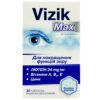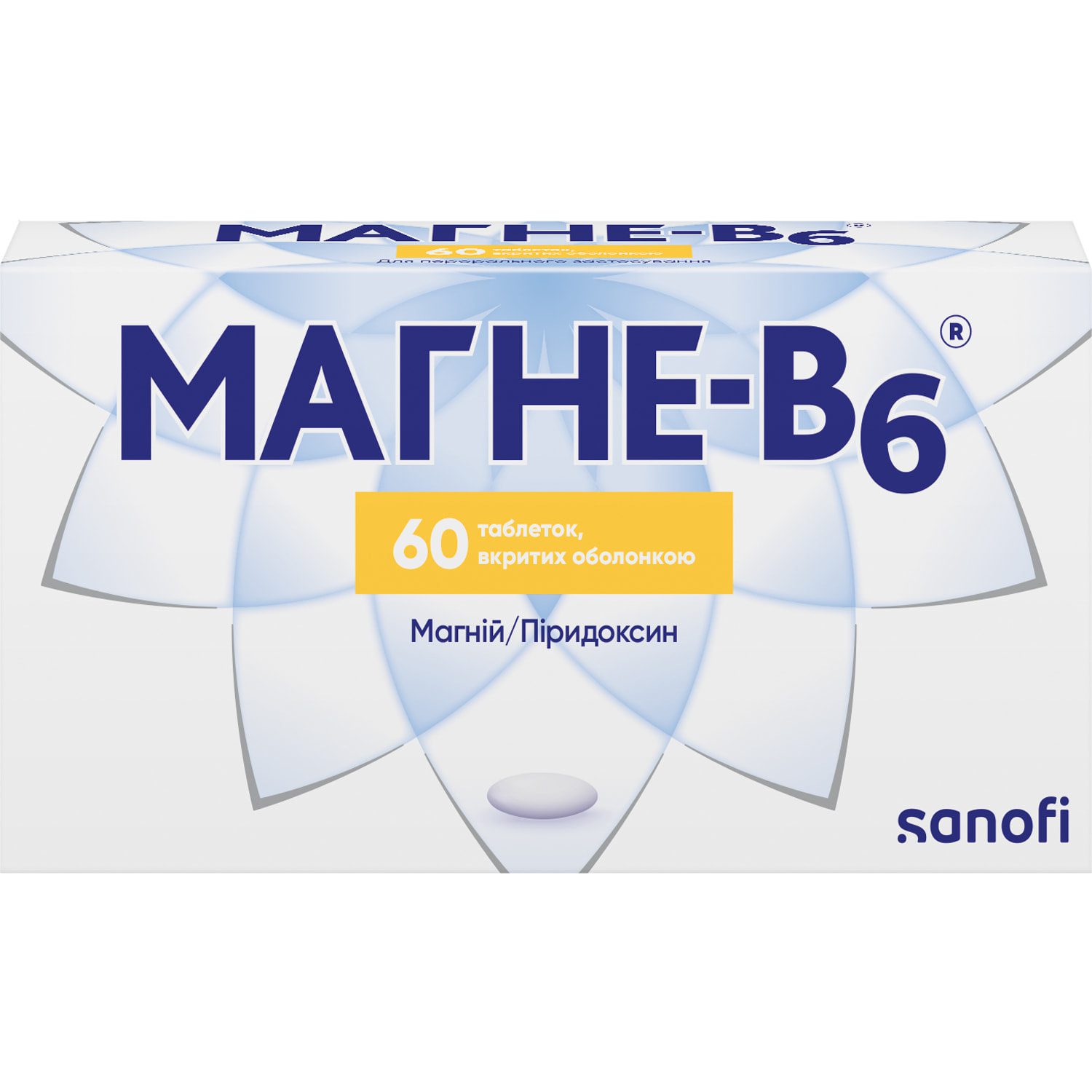No products in the cart.
Great news! The Canada Post strike is over! We’re resuming deliveries to Canada!
Excellente nouvelle ! La grève de Postes Canada est terminée ! Nous reprenons les livraisons vers le Canada !
Great news! The Canada Post strike is over! We’re resuming deliveries to Canada!
Excellente nouvelle ! La grève de Postes Canada est terminée ! Nous reprenons les livraisons vers le Canada !

Magne-B6 film-coated tablets 60 pieces
$25.89
Free Worldwide Shipping
Estimated delivery:
14 - 21 days
Categories: Vitamins and supplements
Brand: Sanofi
MAGNE-B6 is a magnesium supplement designed to treat and prevent magnesium deficiency, supporting the nervous system and muscle function.
MAGNE-B6 is a magnesium preparation for the treatment of magnesium deficiency in the body.
Magnesium is an intracellular cation that reduces the excitability of nerve cells and inhibits neuromuscular transmission. It participates in many enzymatic reactions. It is an important component of the skeleton: human bones contain half of the total amount of magnesium present in the body. Magnesium contained in the drug Magne-B6 is intended for the correction of magnesium deficiency in the body.
Indications for use
Treatment of confirmed magnesium deficiency in the body, both isolated and associated with other deficiency conditions.
Composition
- active ingredients: magnesium, pyridoxine;
- 1 tablet contains magnesium lactate dihydrate 470 mg (corresponding to 48 mg Mg2+, or 1.97 mmol) and pyridoxine hydrochloride (vitamin B6) 5 mg;
- excipients: sucrose, kaolin, acacia, carbomer, talc, magnesium stearate;
- shell: acacia, sucrose, titanium dioxide (E 171), talc, carnauba wax.
Contraindication
Hypersensitivity to any component of the drug. Severe renal failure with creatinine clearance less than 30 ml/min. Phenylketonuria. Hypermagnesemia, vitamin B6 hypervitaminosis, myasthenia gravis. Atrioventricular block, severe arterial hypotension. Simultaneous use with levodopa. Diarrhea. Fructose intolerance, glucose or galactose malabsorption syndrome, sucrase-isomaltase deficiency (due to the content of sucrose in the drug).
Adverse reactions
Immune system disorders – frequency unknown: allergic reactions, hypersensitivity, angioedema.
Gastrointestinal disorders – frequency unknown: diarrhea, nausea, vomiting, abdominal pain.
Skin and subcutaneous tissue disorders – frequency unknown: skin reactions, including urticaria, pruritus, eczema, erythema.
Method of application
The tablets should be swallowed whole with 1 glass of water.
Adults: 6–8 tablets per day, dividing the total dose into 2 or 3 doses during meals.
Children aged 6 years and over (with a body weight of more than 20 kg): 10–30 mg/kg body weight per day (i.e. 0.4–1.2 mmol/kg body weight per day), which corresponds to taking 4–6 tablets per day, dividing the total dose into 2 or 3 doses during meals.
The drug should be discontinued as soon as the magnesium level in the blood reaches normal.
Application features
Patients with severe magnesium deficiency should be started on intravenous administration. This is also indicated for patients with malabsorption.
Use during pregnancy or breastfeeding
Pregnancy: Limited data from clinical studies in animals have not revealed fetotoxic or embryotoxic effects of the drug. Therefore, the use of magnesium during pregnancy is possible only if necessary and after consultation with a doctor.
Breastfeeding. Each of the active ingredients of the drug separately (both magnesium and vitamin B6) is not contraindicated during this period. Given the limited evidence on the use of the maximum recommended daily dose of vitamin B6 during breastfeeding, it is recommended to prescribe no more than 20 mg/day of vitamin B6.
Children
The drug is used in children aged 6 years and older. Appropriate dosage forms are available for use in children under 6 years of age.
Ability to influence reaction speed when driving vehicles or other mechanisms
The drug Magne-B6, film-coated tablets, has no or negligible effect on the reaction rate when driving or using other mechanisms.
Overdose
Magnesium-related
Overdose of oral magnesium usually does not lead to toxic reactions in patients with normal renal function. However, magnesium intoxication may develop in patients with renal insufficiency.
Toxic effects depend on magnesium levels in the blood and are manifested by the following signs:
- a sharp decrease in blood pressure;
- nausea, vomiting;
- central nervous system depression, impaired reflex functions;
- pathological changes on the ECG;
- development of respiratory depression, coma, cardiac arrest and respiratory paralysis;
- anury.
Treatment of overdose: rehydration, forced diuresis. Patients with renal failure require hemodialysis or peritoneal dialysis.
Interaction with other medicinal products and other types of interactions
Contraindicated combinations.
Concomitant use with levodopa should be avoided, as the effect of levodopa is inhibited when its use is not accompanied by peripheral dopa decarboxylase inhibitors. The use of pyridoxine in any quantities is not indicated if levodopa is not accompanied by dopa decarboxylase inhibitors.
Not recommended combinations.
Do not use with drugs containing phosphate or calcium salts, as they inhibit the absorption of magnesium from the intestines.
Storage conditions
Store at a temperature not exceeding 30 ° C. Keep out of the reach of children.
Be the first to review “Magne-B6 film-coated tablets 60 pieces” Cancel reply
You may also like










Reviews
There are no reviews yet.